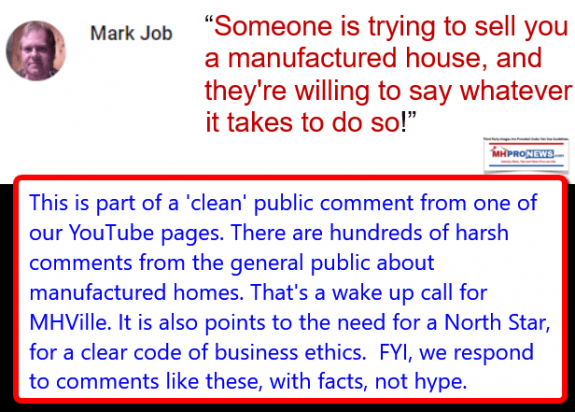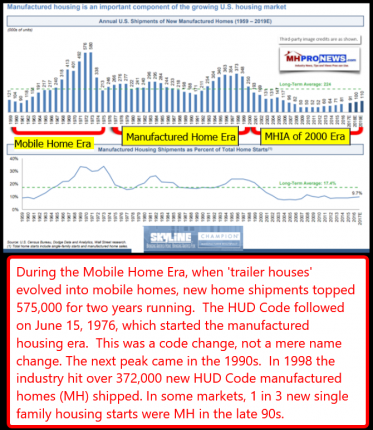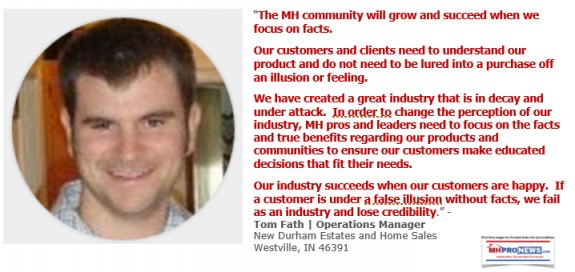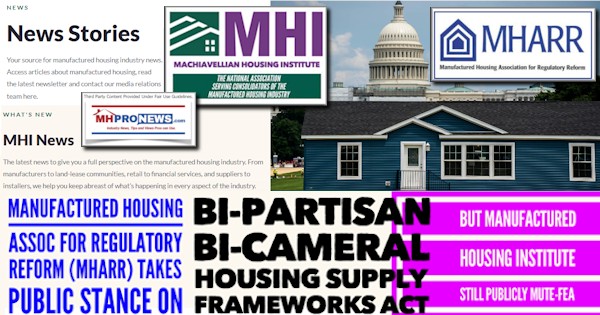
“This is why we operate with a “North Star Goal‘, a light that represents the highest aspirations of a business. Like a next-generation mission statement, a North Star Goal orients the identity and direction of a brand, guiding all decisions, strategies, and partnerships.”
– Bag the Habit.
(emphasis added)
The northern star for centuries was and remains today as a guiding light in the nighttime sky, a star which helped sailors orient their direction at sea.
“The North Star shines with a humble brightness that belies its navigational importance. Polaris, or the North Star, sits almost directly above the North Pole; therefore, it is a reliable gauge of North if you find yourself lost on a clear night without a compass,” says Universe Today.
What is the North Star for Manufactured Housing?
When morality in America represented a broadly shared set of values, many of the professional issues faced today were less evident. There was no huge pushback in the 1950s when in the words “In God We Trust” was placed upon U.S. currency. There was less debate when images of the Ten Commandments were set in stone, or otherwise framed and placed in public settings or taxpayer funded buildings.
Shared Judeo-Christian values gave some 97 percent of the people greater moral clarity.
Time magazine reported in 2016 that, “a 1965 poll by Lou Harris finding that 97% of Americans still believed in God. By the time Gallup asked the same question in 2014, that number had fallen to 86%, with 12% of Americans claiming no belief and 2% with no opinion.”
Also in 2016, a Time article said, “In God We Trust” was first added to U.S. coins during the beginning of the Civil War, when religious sentiment was on an upswing and concerned Americans wanted the world to know what their country stood for. Many wrote to Secretary of the Treasury Salmon P. Chase on the matter, and he agreed with their arguments. Congress passed his act requesting the addition of “In God We Trust,” adapted from a lesser-known verse of Francis Scott Key’s “Star-Spangled Banner,” and the first two-cent coin with the phrase was minted in 1864.”
Let’s be blunt. Consumers want to do business with honest professionals.
Few want to walk into a business that has a reputation for dishonesty.
Shared common values are so useful in society, that several of the founding fathers wrote that they deemed them to be essential to America’s success. That doesn’t mean that every manufactured home sales office ought to have to have a Bible on every desk, but it does mean that a business ought to reflect its values through behavior. Indeed, most do.
But what about those organizations that don’t?
In our routine interactions with consumers – due to publishing, marketing and sales coaching/training with MHPros, and in online discussions with the public – it is safe to say that manufactured housing is unjustly viewed dimly by millions.
But whining about an undeserved image isn’t a solution.
Good industry businesses and professionals must get to the root issues, or the “image issues” caused by problematic people and/or organizations will define the good. That’s reality.
Consumers may not use the term “morality,” or “ethics.” But experience shows that a significant part of their distrust of the manufactured home industry is rooted in a lack of confidence in what is said.

How are more new manufactured home sales achieved, without addressing the causes of the public’s lack of trust?
When so-called industry leaders are seen as giving cover for arguably unethical activity, doesn’t that just fuel the problem? A recent, actual case may serve to make the point.
Public officials and consumers alike have accused a business of “selling” homes to consumers “contract for title” when the seller allegedly doesn’t even own the units being sold. Doesn’t’ that type of story, repeatedly in a region’s local news, only fuels a negative image about manufactured housing and industry professionals?
When industry publishers and association leaders fail to fairly investigate and address that type of transgression in some lawful, and appropriate fashion, isn’t it reasonable to presume that more of the public’s confidence in manufactured housing as an industry can be further undermined?

Manufactured Housing Radix
Google’s online dictionary defines both a mathematical meaning for the term “radix,” and a formal meaning. The formal definition says this about radix,
“a source or origin of something.
“Judaism is the radix of Christianity“
Radix is Latin, which is used some in medicine. Collins dictionary says this, “Word origin of ‘radix’ C16: from Latin rādīx root; compare Greek rhadix small branch, rhiza root.”
So, radix is the root, the origin or foundational issue.
For manufactured housing and the public, its an issue of trust. When millions a year in the U.S. consider manufactured homes, but only some 92,900 bought a new one in 2017, that’s a wake up call.
Morality is essential at every level of business and society. For example, if brute force power becomes the organizing principle of Americans and business in the U.S., the nation is debatably heading toward even more turbulent waters.
Clear codes of business ethics that include action, not mere lip service, are a must if our industry is to thrive again.
In response to a controversy over some problematic advertising – MHI advertorials – industry professional, millennial Tom Fath, said this.

It is safe to say that none of us live up perfectly to the moral code set forth in the Ten Commandments. Everyone slips and falls, but isn’t part of the question what happens after a mistake is made? Is the error covered up? For example, are consumers who are wronged made whole?
In the Daily Business News reports and analysis, the facts, the truth, and common decency – morality – are referenced as guiding lights.
When deception is occurring, it ought to be roundly condemned and corrected in some appropriate fashion.
That’s a sense of our North Star as a trade publisher. What about you and your business? “We Provide, You Decide.” © ## (News, analysis, and commentary.)
Related Reports:
Industry Voices
In the NPR story, the blame is on the community owner, tenants, county, and state. This failure is across-the-board and does not represent the industry as whole, but is a growing problem that needs to be addressed when communities are used for investment purposes by those who don’t know what they are doing.
George Allen Blasts MHI, NCC Ignoring Own, Spencer Roane, SECO, COBA7, Tom Lackey Controversies
Affordable Housing Focus Group – Comparing Housing Options – Conventional Houses, Condo, Rentals, and Manufactured Homes – Up for Growth, National Association of Realtor, Studies – manufacturedhomelivingnews.com
The Up for Growth National Coalition just published a new report that says the affordable housing crisis is more serious than many realize, and is growing. While their estimates differ, they come to a similar conclusion as the National Association of Realtors (NAR) Lawrence Yun did.

1) To sign up in seconds for our MH Industry leading emailed news updates, click here.
2) To provide a News Tips and/or Commentary, click the link to the left. Please note if comments are on-or-off the record, thank you.
3) Marketing, Web, Video, Consulting, Recruiting and Training Resources


























